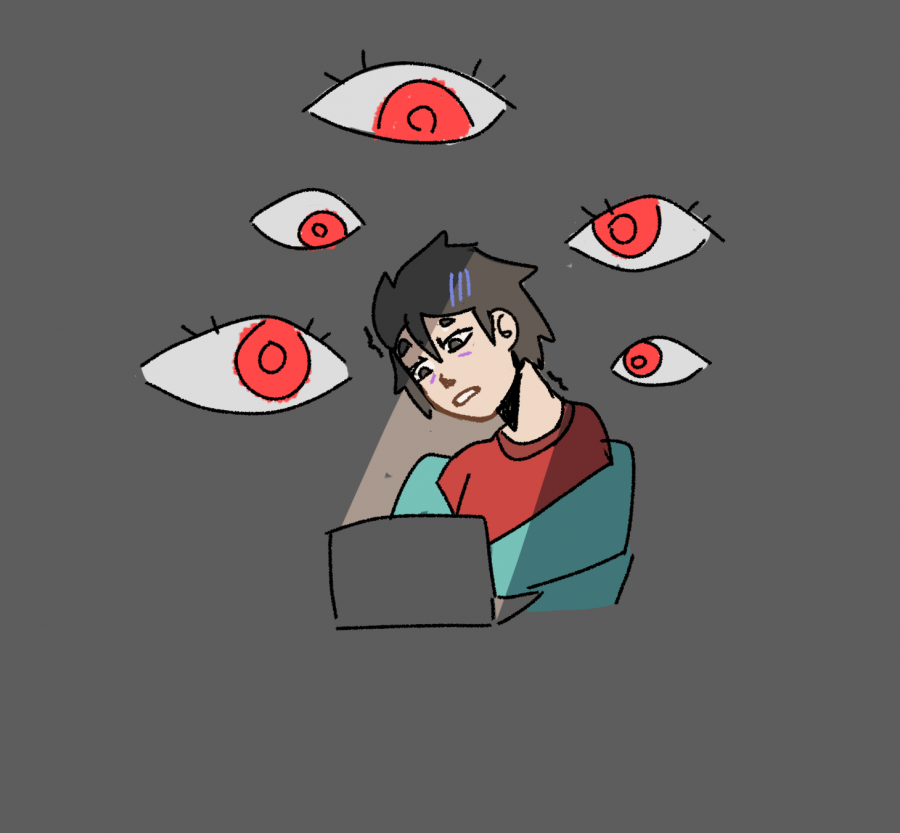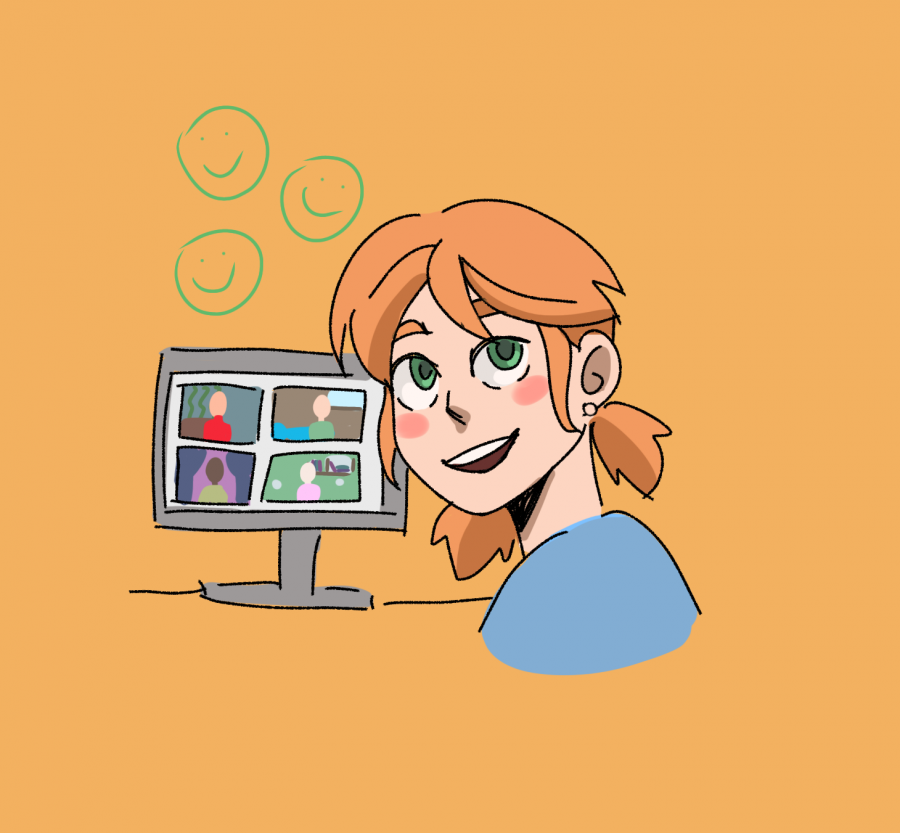B&G: Should students be required to turn their cameras on during Zoom classes?
December 30, 2020
Due to the COVID-19 pandemic, a large portion of school systems across the country have shifted to online learning. One main feature of these virtual classes is camera video sharing between classmates and instructors. While some students and teachers are eager to turn on their cameras during classes, others feel less comfortable doing so. Those in favor of camera mandates argue it increases participation and benefits teachers, though many counter this by claiming it is too intrusive for students. Read the following two articles for both perspectives on the issue.
Exposing students during the most stressful times, Zoom cameras should not be required
Breakout rooms have been the most challenging aspect of online learning to overcome.
This year, virtual school has forced Richard Montgomery students into a confusing and stressful learning environment. From the endless barrage of 11:59 p.m. deadlines to the absence of social interactions, online school is exhausting enough without the constant insistence from teachers to turn on cameras during Zoom classes.
Richard Montgomery needs to prioritize student mental health and overall wellbeing by not requiring zoom cameras–especially since it is such a fatiguing task for many. It brings emotional discomfort and invades the security of students. If cameras are not essential to a course, then they are more problematic than they are beneficial.
Enforcing a camera mandate could worsen the quality of a student’s learning experience. Many are uncomfortable with displaying their surroundings to all their classmates, while others suffer from other forms of anxiety and self-consciousness. By forcing a student to keep their camera on all day, they will be distracted from their lessons with these concerns. High school students could get discouraged and unmotivated to complete their work because of this heightened stress.
Aside from the camera-sharing aspect, virtual school, in general, has been a difficult transition for high school students. Physical education and health teacher Barbara Contino said, “I have had kids say online school is interfering with their motivation to do things… they are telling me they are depressed and anxious.” Reminders to turn cameras on, among other virtual elements, might seem harmless to the teachers, but they can create distress for many students and make online school an unnecessarily intimidating environment.
Spending up to 12 hours a day sitting behind a screen for school-related activities, many are experiencing a new phenomenon called “Zoom fatigue”. For hours a day, students are forced to maintain online etiquette and focus their attention on the unnatural pixelated faces of their teachers and classmates. Piling on constant video engagement can drain and disengage high schoolers. Sometimes, a black screen of names can provide a much-needed release from having to keep up appearances. To keep students’ drive for learning intact, their mental health should be considered first.
Montgomery County Public Schools administration failed to understand the impact of online school on high school student’s already fragile mental health. Virtual school has already exacerbated existing mental health conditions in many students and developed new ones in others. For something that appears trivial, many students are consumed by the petrifying thought of having everyone in class looking at them. This results in the possibility of them falling behind in their classes. School administration and staff are eager to alleviate burdens on students, and the elimination of camera policies offers a simple yet effective method of doing so.
High schoolers are already bombarded with daily obligations, and turning on cameras has begun to feel like another dismaying chore. Junior Natasha Nguyen said, “with so many classes and assignments, some days I just want to keep my camera off because it can be overwhelming.” If the requirement of Zoom cameras does not incur any significant benefit, then it should not be mandated.
By requiring Zoom cameras, students are also pressured to reveal deeply personal aspects such as their living conditions or even family issues. During a worldwide pandemic in which numerous families are struggling due to reduced income or domestic troubles, many students may feel too uneasy with exposing their personal environments after extreme changes to their lives. Sophomore Paulyn Baringanire said, “I feel like a lot of people feel uncomfortable and it shouldn’t be forced on us.” Teachers need to empathize with students and respect personal privacy.
High schools are often rampant with bullying and camera requirement policies warrant unwanted attention for many students. Ill-intentioned students could abuse the misfortunes of others and send damaging messages to struggling classmates. This only compounds the already strenuous effects of virtual schooling. The simplest solution to deter such bullying is to ensure a lack of camera requirements.
The absence of cameras allows students to feel safe and respected in a virtual environment. By establishing trust with their teachers, high schoolers will feel more at ease and potentially participate more in class. It is important to respect student privacy and mental health as failing to do so could be detrimental to their quality of education. Once RM focuses on the comfort of students, the difficulties of a virtual school year are more likely to subside. If teachers could tolerate the occasional black screen, then online school would be a much less dreadful experience for students.
Providing a means for the most intrinsic social interactions, cameras should be required during Zoom classes
Graphic Courtesy of Jessica Wu
Due to COVID-19, many changes have been made to the participation of extracurricular activities, including clubs, sports and volunteer opportunities.
During the 2020-2021 school year, Montgomery County Public Schools witnessed a massive spike in the number of students failing their classes, and schools are scrambling to figure out how they can improve virtual learning. Online school has drained students, leaving them overwhelmed, undermotivated and paralyzingly stressed. Additionally, teachers have been forced to navigate through online school for the first time with the expectation that they will teach all the required material while also being mindful of each student’s individual situation. In order to alleviate the burden on both groups, students should be required to take the simple but impactful step of turning on their cameras.
Ever since virtual learning began, the number of students failing classes has increased threefold compared to previous school years, VOA News reported. One of the key factors in this drop is the absence of students and teachers forming strong relationships. According to NPR, school systems that have been successful in online migration are ones that have focused on communication, relationships and social learning. Making cameras mandatory for online school would be conducive to a cohesive learning environment because it allows students and teachers to associate voices with actual faces.
Student-teacher relationships are essential, but students that refrain from turning their cameras on create obstacles to their formation. Junior Sarah Luan said, “for me, it’s important to have cameras on because you can actually make more of an engaging environment with your classmates and teachers.” Students learn better when they can comfortably communicate with their teachers and tell them when they are having trouble so the teacher can better assist them. Students feel less alone even when they are trapped in their homes or isolated from other people. Small interactions make a world of difference to some.
Keeping cameras on would also keep students accountable, ensuring they are not constantly looking at their phones or completing other assignments during instructional time. Sophomore Desiree Chen said, “[keeping cameras on] just allows me to focus because the teacher can see what I’m doing when I have my camera on.” One of the biggest aspects missing in a virtual environment is a teacher’s ability to keep track of all students and gauge their understanding. History teacher John Pearce said, “I can’t see what they’re doing [when cameras are off] and like, help them when they feel like they need it, or like when they might not even realize that they’re needing help.”
A commonly shared frustration with online school among teachers is having to stare at a black screen of names. Teachers already have to deal with not being able to interact directly with their students or have the advantage of teaching in a physical environment, so students having their cameras off is another barrier they have to overcome just to do their jobs. Zoom rooms, where students share their video, mimic in-person settings that permit natural interactions and dialogue. Pearce says, “I already feel lost in not knowing how to help students… so [turning cameras on is] just one way I can connect [with] the students.”
Facial expressions and reactions are essential for teachers, especially during online learning, as it is impractical for students to unmute and respond each time an instructor shares an interesting comment or makes a joke. Additionally, it is tedious for teachers to constantly check all their private messages and disturbs the flow of the class. When a teacher can visibly see a student’s confusion, it gives teachers the sign to elaborate, repeat directions or pause to ask if anyone has questions. Having cameras off prevents this natural way of showing emotion.
The biggest argument against mandatory camera policies is a student’s individual home situation, discouraging them from showing their faces or surroundings. Familial issues, anxiety, and other problems contribute to some students being reluctant to turn on their cameras. However, accommodations for these types of situations are already provided at Richard Montgomery and permit students with legitimate extenuating circumstances to keep their cameras off through a process outlined in a letter sent out by Principal Damon Monteleone. This solves the problem of students who cannot or are unwilling to turn on their cameras due to their unique circumstances.
While the introduction of online learning in places like MCPS is the safest and most responsible response during this pandemic, the gaps and differences between online and physical learning are vast. With climbing fail rates and struggling teachers, making online learning similar to physical learning should be a priority and mandatory camera policies being a key way to achieve an experience similar to an in-person class. During these times of social isolation and loneliness, the simple gesture of turning on a camera can bring communities closer together and provide us with some much-needed sense of normalcy.

